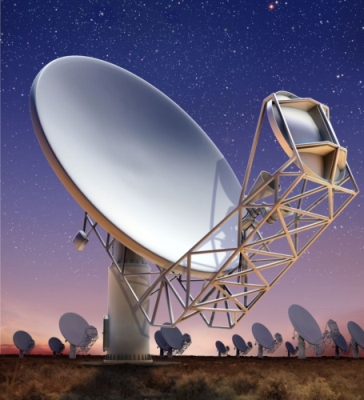General Dynamics SATCOM Technologies, a provider of radio astronomy, tactical, strategic and emergency satellite communications equipment, has entered into a partnership with Stratosat Datacom to deliver 64 radio antennas for South Africa's MeerKAT radio telescope array.
 General Dynamics to Deliver Antennas for Largest, Most Powerful Radio Telescope in Southern Hemisphere. General Dynamics to deliver 64 radio antennas specially designed for MeerKAT telescope array in Northern Cape province of South Africa. (PRNewsFoto/General Dynamics C4 Systems)
General Dynamics to Deliver Antennas for Largest, Most Powerful Radio Telescope in Southern Hemisphere. General Dynamics to deliver 64 radio antennas specially designed for MeerKAT telescope array in Northern Cape province of South Africa. (PRNewsFoto/General Dynamics C4 Systems)
The radio telescope is touted to be the most powerful and largest in the southern hemisphere. The 13.5 m main reflector of the antenna is dish-shaped and has been specially configured. It delivers greater optical performance and reception sensitivity, which makes it suitable for radio-telescope applications. The telescope has the ability to bypass radio interference from terrestrial transmitters and satellites. This will enable astronomers to look at earlier galaxies and study new areas of science including nature of transient radio sources, dark matter and the cosmos structure.
The baseline of the array will be about 8 km. The installation of the first antenna is expected to be completed in 2013, and installation of all the 64 antennas is to be completed by 2016.
The contract is valued at $75 million and the General Dynamics SATCOM and Stratosat partnership will utilize the opportunity to involve the local industry and improve their skills. This will include most of the manufacturing along with tooling design and testing. General Dynamics SATCOM will also be providing ancillary electronic components and support required for the MeerKAT program.
The MeerKAT telescope array is a part of the Square Kilometer Array (SKA). It forms 25% of the Phase I scope. The SKA is expected to be completed in 2024 and will become the world's biggest telescope. The South African Department of Science and Technology is providing funds for the project.
The radio antenna program is being executed in the Northern Cape province of South Africa.